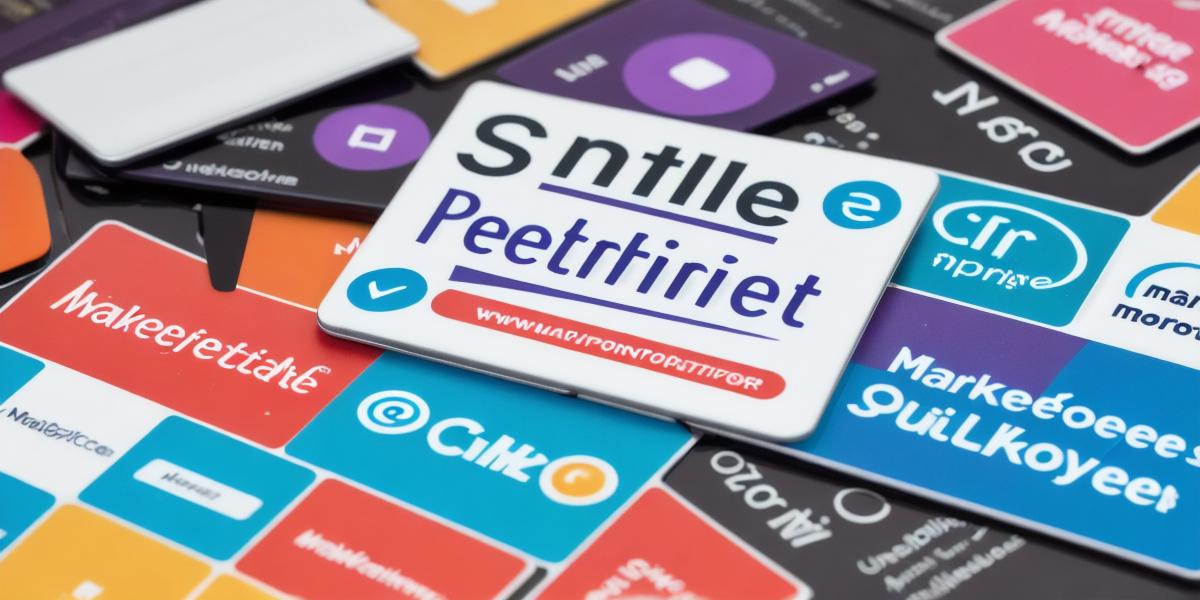How can I effectively market myself online to increase my visibility and attract potential opportunities
Marketing Yourself Online: A Comprehensive Guide to Increase Visibility and Attract Potential Opportunities
In today’s digital age, marketing yourself online has become an essential tool for personal and professional growth. With the increasing use of social media platforms and search engines, it is crucial to have a strong online presence to increase visibility and attract potential opportunities. In this comprehensive guide, we will explore various strategies and techniques that can help you effectively market yourself online to achieve your goals.
I. Introduction
A. Importance of Marketing Yourself Online
B. Target Audience
C. Objectives of the Guide
II. Establishing Your Personal Brand
A. Understanding Your Unique Value Proposition (UVP)
B. Creating a Strong Visual Identity
C. Developing a Consistent Messaging Strategy
D. Building an Engaging Portfolio
III. Leveraging Social Media Platforms
A. Choosing the Right Social Media Channels for Your Goals
B. Creating Engaging Content
C. Building a Community of Followers
D. Utilizing Influencer Marketing
E. Measuring and Analyzing Your Social Media Performance
IV. Optimizing Your Online Presence with SEO
A. Understanding the Importance of Search Engine Optimization (SEO)
B. Keyword Research and Analysis
C. On-Page Optimization Techniques
D. Off-Page Optimization Techniques
E. Measuring and Tracking Your SEO Performance
V. Utilizing Email Marketing
A. Building an Email List
B. Crafting Compelling Email Campaigns
C. Personalizing Email Content
D. Measuring and Analyzing Your Email Marketing Performance
VI. Networking Online
A. Joining Relevant Online Communities
B. Engaging in Online Discussions
C. Building Relationships with Influencers
D. Utilizing Online Job Boards
VII. Monetizing Your Online Presence
A. Affiliate Marketing
B. Sponsored Content
C. Digital Product Creation
D. Online Coaching and Consulting
VIII. Summary
A. Recap of Key Points
B. Final Thoughts on the Importance of Effective Online Marketing
C. Call to Action for Readers to Implement These Strategies in Their Own Lives
I. Introduction
In today’s digital age, marketing yourself online has become an essential tool for personal and professional growth. With the increasing use of social media platforms and search engines, it is crucial to have a strong online presence to increase visibility and attract potential opportunities. In this comprehensive guide, we will explore various strategies and techniques that can help you effectively market yourself online to achieve your goals.
A. Importance of Marketing Yourself Online
Marketing yourself online allows you to reach a wider audience, establish your expertise in your field, and create new opportunities for personal and professional growth. By creating an effective online presence, you can build relationships with potential clients, collaborate with other professionals, and increase brand awareness.
B. Target Audience
The target audience for this guide is individuals who are looking to effectively market themselves online to attract new clients or career opportunities. This includes entrepreneurs, freelancers, professionals, and students.
C. Objectives of the Guide
The objectives of this guide are to provide a comprehensive overview of strategies and techniques that can help you effectively market yourself online. The guide aims to equip readers with practical tools and tips to establish a strong online presence, increase visibility, and attract potential opportunities.
II. Establishing Your Personal Brand
A. Understanding Your Unique Value Proposition (UVP)
The first step in marketing yourself online is to understand your unique value proposition (UVP). Your UVP is what sets you apart from others in your field and defines your personal brand. To create an effective UVP, consider your skills, experience, values, and goals. Ask yourself what makes you unique and how you can provide value to others.
B. Creating a Strong Visual Identity
A strong visual identity is essential for creating a lasting impression on potential clients or employers. This includes creating a professional website or portfolio that showcases your work, choosing a consistent color scheme and typography, and designing business cards and other marketing materials that reflect your brand.
C. Developing a Consistent Messaging Strategy
Developing a consistent messaging strategy is crucial for establishing a strong personal brand. Your messaging should be clear, concise, and aligned with your UVP. Consider using a tagline or slogan to encapsulate your brand’s essence and use it consistently across all marketing materials.
D. Building an Engaging Portfolio
Your portfolio is the most important tool for showcasing your skills and experience to potential clients or employers. A well-designed portfolio should include examples of your work, testimonials from previous clients, and a clear call to action.
III. Leveraging Social Media Platforms
A. Choosing the Right Social Media Channels for Your Goals
Different social media platforms have different audiences and require different types of content. Consider your goals and target audience when choosing which platforms to focus on. For example, LinkedIn is a great platform for professionals looking to connect with other professionals, while Instagram is ideal for showcasing creative work.
B. Creating Engaging Content
Creating engaging content that resonates with your target audience is essential for building a following and attracting potential opportunities. Consider using a mix of formats such as blog posts, videos, infographics, and social media posts to keep your audience engaged.
C. Building a Community of Followers
Building a community of followers is key to establishing yourself as an expert in your field and attracting new clients or career opportunities. Engage with your followers by responding to comments and messages, hosting giveaways or contests, and sharing valuable content.
D. Utilizing Influencer Marketing
Influencer marketing can be an effective way to reach a wider audience and increase brand awareness. Identify influencers in your field who have a strong following and collaborate with them by guest posting, running social media campaigns, or offering giveaways.
E. Measuring and Analyzing Your Social Media Performance
Measuring and analyzing your social media performance is essential for understanding what works and what doesn’t. Use analytics tools to track your followers, engagement rates, and click-through rates. Use this data to adjust your content strategy and identify areas for improvement.
IV. Optimizing Your Online Presence with SEO
A. Understanding the Importance of Search Engine Optimization (SEO)
Search engine optimization (SEO) is a crucial component of marketing yourself online. By optimizing your website and online presence, you can increase your visibility in search engines and attract more traffic to your site.
B. Keyword Research and Analysis
Keyword research and analysis are essential for identifying the most relevant keywords to target in your SEO efforts. Use keyword tools to identify popular search terms related to your field and incorporate them into your website’s content, meta tags, and headings.
C. On-Page Optimization Techniques

On-page optimization techniques include optimizing your website’s content, titles, and meta descriptions for relevant keywords. Use header tags, subheaders, and bullet points to make your content easy to read and scan, and include internal and external links to increase authority and improve user experience.

D. Off-Page Optimization Techniques
Off-page optimization techniques include building high-quality backlinks from other reputable websites in your field. This can be done through guest posting, broken link building, or outreach to other website owners.
E. Measuring and Analyzing Your SEO Performance
Measuring and analyzing your SEO performance is essential for understanding what works and what doesn’t. Use analytics tools to track your website traffic, keyword rankings, and search engine visibility. Use this data to adjust your SEO strategy and identify areas for improvement.
V. Building a Personal Brand
A. Establishing Yourself as an Expert in Your Field
Establishing yourself as an expert in your field is key to attracting new clients or career opportunities. Share your expertise by writing blog posts, creating videos, or hosting webinars. Participate in online forums and communities related to your field to showcase your knowledge and establish yourself as a thought leader.
B. Creating a Professional Personal Brand
Your personal brand should reflect your professionalism and expertise. Use a consistent tone of voice across all marketing materials, and avoid using slang or overly casual language. Consider getting business cards and other marketing materials designed by a professional to give yourself a more polished look.
C. Networking and Building Relationships
Networking and building relationships is essential for advancing your career or attracting new clients. Attend industry events, join online communities, and connect with other professionals in your field. Be proactive in reaching out to others and offering value through collaboration or referrals.
VI. Summary
Marketing yourself online is a crucial component of building a successful personal brand and attracting new clients or career opportunities. By understanding your unique value proposition, creating an engaging portfolio, leveraging social media platforms, optimizing your online presence with SEO, and building a professional personal brand, you can establish yourself as a valuable member of your field and achieve your goals.




